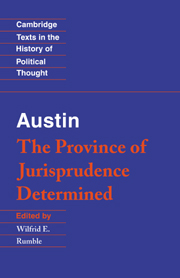Book contents
- Frontmatter
- Contents
- Acknowledgements
- Introduction
- Note on the text
- Chronology of John Austin's life
- Selected bibliography
- Biographical notes
- The Province of Jurisprudence Determined
- Abstract of Lectures
- Analysis of Lectures
- Lecture I.
- Lecture II.
- Lecture III.
- Lecture IV.
- Lecture V.
- Lecture VI.
- Index
- Cambridge Texts in the History of Political Thought
Abstract of Lectures
Published online by Cambridge University Press: 02 December 2009
- Frontmatter
- Contents
- Acknowledgements
- Introduction
- Note on the text
- Chronology of John Austin's life
- Selected bibliography
- Biographical notes
- The Province of Jurisprudence Determined
- Abstract of Lectures
- Analysis of Lectures
- Lecture I.
- Lecture II.
- Lecture III.
- Lecture IV.
- Lecture V.
- Lecture VI.
- Index
- Cambridge Texts in the History of Political Thought
Summary
Lecture I.
The purpose of the following attempt to determine the province of jurisprudence, stated or suggested. – The manner of the following attempt to determine the province of jurisprudence. – Law: what, in most comprehensive literal sense. – Law of God. – Human Laws. – Two classes: 1st Laws set by political superiors; 2ndly, Laws set by men not political superiors. – Objects improperly, but by close analogy, termed laws. – The two last placed in one class under the name positive morality. – Objects metaphorically termed laws. – Laws or rules, properly so called, are a species of commands. – The meaning of the term command. – The meaning of the term duty. – The terms command and duty are correlative. – The meaning of the term sanction. – To the existence of a command, a duty, and a sanction, a violent motive to compliance is not requisite. – Rewards are not sanctions. – The meaning of the term command, briefly re-stated. – The inseparable connection of the three terms, command, duty, and sanction. – The manner of that connection. – Laws or rules distinguished from commands which are occasional or particular. – The definition of a law or rule, properly so called. – The meaning of the correlative terms superior and inferior. – Laws (improperly so called) which are not commands. – Laws (properly so called) which may seem not imperative.
- Type
- Chapter
- Information
- Austin: The Province of Jurisprudence Determined , pp. 3 - 9Publisher: Cambridge University PressPrint publication year: 1995
- 3
- Cited by



